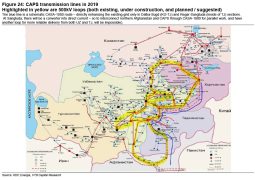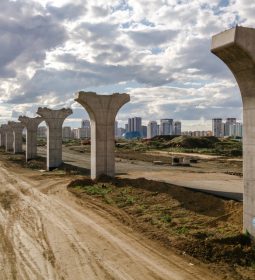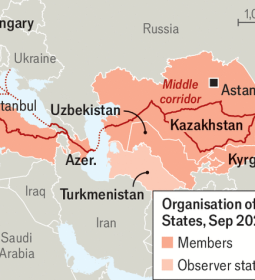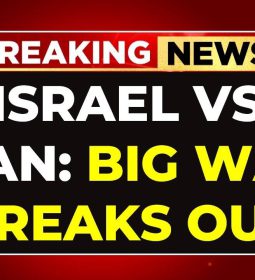Russia and Iran take into account each others interests over the ‘Zangezur Corridor’
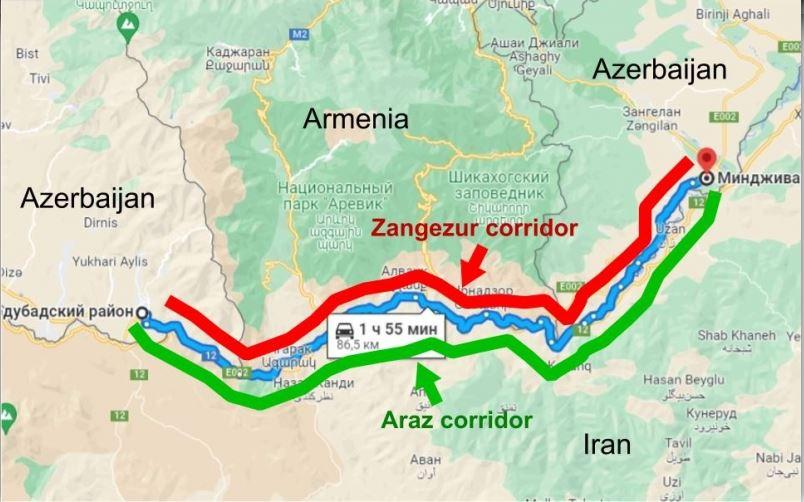
The Zangezur Corridor project has become a geopolitical flashpoint for major regional stakeholders, including Russia, Iran, Turkiye, Azerbaijan, and Armenia, where competing interests threaten to reshape regional alliances, trade routes, and borders.
On the periphery of West Asia – which is currently diverted by war centered on Gaza – tensions are rising in the South Caucasus, where Iran, Russia, and Turkiye are entangled in a long-standing geopolitical rivalry for influence in Armenia and Azerbaijan.

At the heart of this dispute is the Zangezur Corridor, a 40-kilometer transit route set to link Azerbaijan to its enclave Nakhchivan, which would cut through Armenian territory. This disputed route has wider implications: it would bypass Armenian checkpoints and connect Turkiye directly to Central Asian Turkic-speaking countries and beyond, to China and Europe.
But it would also potentially disrupt Iran’s direct border with Armenia, cut off its transit route between Azerbaijan and Nakhchivan, and negatively impact its trade relations with Central Asian neighbors. Moreover, Tehran believes the Zangezur Corridor is a western-backed project to encircle Iran, Russia, and China and that Moscow, diverted by its war in Ukraine, is not seeing that threat developing on Iran’s northern border.

Rising concerns over Russian mediation
While construction is said to have started nearly a year ago, the project has recently garnered significant attention in Iranian media, fueled by comments from Russian officials that sparked new concerns.
In late August, Russian President Vladimir Putin informed his Azerbaijani counterpart, Ilham Aliyev, of Moscow’s readiness for mediation to end the decades-long animosity between Azerbaijan and Armenia.
Foreign Minister Sergei Lavrov simultaneously accused the Armenian leadership of sabotaging the deal concerning the opening of the routes of communication through the Syunik region of Armenia.
Of note, the deal was signed in 2020 between Baku and Yerevan following the Second Karabakh War.
Iranian media ramped up coverage following a proposal from Armenian Prime Minister Nikol Pashinyan, who proposed Baku formalize a peace treaty. This gesture, seen as an attempt to sideline Russia and keep it from controlling the Zangezur Corridor, stoked fears in Tehran that Russia might be aligning itself with those supporting the corridor and potentially betraying Iran’s interests.
Iran’s opposition to the Zangezur Corridor stems from both geopolitical and economic concerns. Sharing a 45 to 50-kilometer border with Armenia, Iran worries that the corridor would cut off its access to Europe via Armenia and Georgia. This would not only reduce Iran’s number of neighbors from 15 to 14 but also close a critical window for trade.

Some Iranian observers have dubbed the corridor the “NATO Turanic Corridor,” suggesting it could serve as a gateway for the western military organization and Israel to gain a foothold along Iran’s borders. They also fear increased influence from Turkiye and Azerbaijan, which could embolden separatist movements in Iran’s Azeri-speaking provinces.
Strategic and economic considerations
Speaking to The Cradle, senior Iranian analyst and expert in Russian–Iranian affairs, Rouhollah Moddaber, says, “Iran gives great importance to its historic 2,000-year border with Armenia and does not accept any changes to its northwest border. Based on international law, Iran states nothing can disconnect it from Armenia.”
Mohammad Jamshidi, deputy chief of staff for Political Affairs under Iran’s late President Ebrahim Raisi, tells The Cradle, “Iran considers the (so-called) Zangezur Corridor a geopolitical, economic, and even identity threat, and the late president’s government succeeded in halting the establishment of this route.”
Modabber adds:
What Russia seeks is a route to connect proper Azerbaijan to Nakhchivan [and therefore facilitating trade and communication] through Armenia’s Syunik province. Unlike Baku, which plans to occupy the southern belt of the Syunik region, merge it with Nakhchivan and turn it into a corridor. Such a corridor would inevitably impose a legal and international regime on all involved parties, including Iran.
Ehsan Azizi, the owner of a Transportation company active in the South Caucasus and Russia, thinks Iran’s opposition has economic grounds. He believes “the opening of the Zangezur would reduce Iran’s transit revenues.”
The closure of routes between Azerbaijan and Nakhchivan has forced Azeri, Turkish, Armenian and Russian companies to pay tolls for using Iranian roads to reach their destinations. Insurance and banking sanctions on Iran are another problem. Insurance companies don’t issue policies for cargoes that travel through Iran. That adds to costs for foreign companies.
Jamshidi, however, rejects Azizi’s claims, saying that “banking or insurance issues do not form an obstacle” and insisting that Iran has already taken steps to ease trade costs, including tariff unifications. He emphasizes that Iran’s concerns are not economic but geopolitical and strategic.
Moddaber also dismisses Azizi’s explanations as “baseless” and makes it clear that “Iran has been very generous in the past three decades, giving access to the Azeris to reach Nakhchivan via Iran, free of charge.”
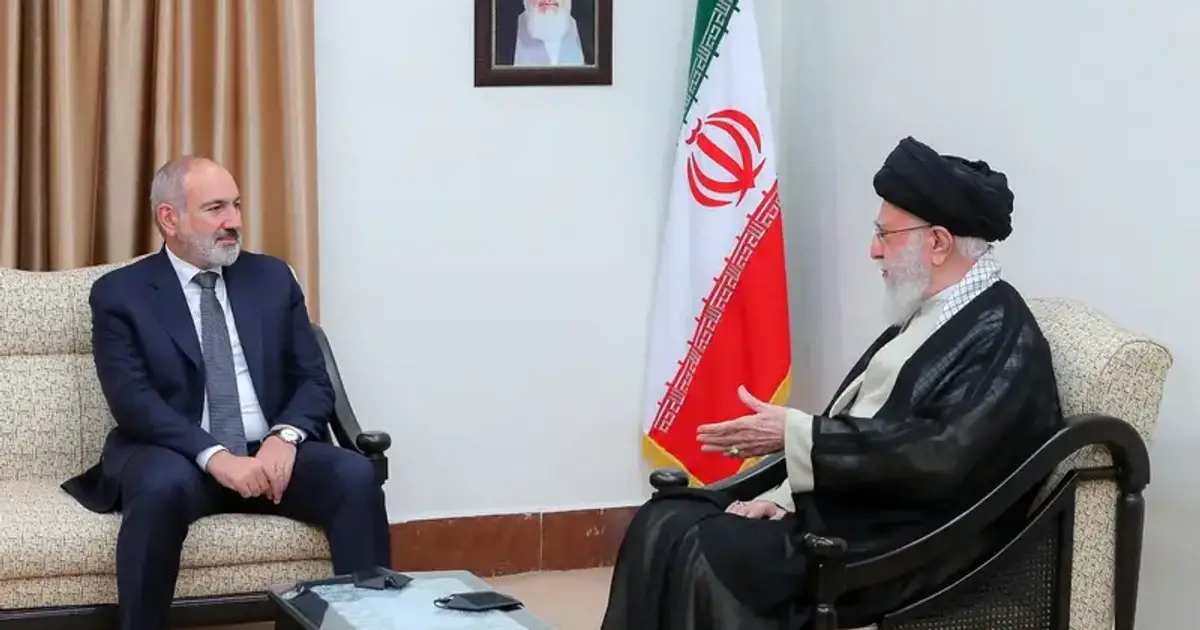
Iran’s alternative routes to counter Zangezur
Iran has been proactive in proposing alternative routes to address regional transport challenges. One such initiative is the “Aras Corridor,” an agreement between Iran and Azerbaijan reached in October 2023. This route would link Azerbaijan’s Zangilan district with Iran’s East Azerbaijan, restoring Baku’s access to Nakhchivan without cutting through Armenia.
In addition, Iran is championing the International North-South Transit Corridor (INSTC), which aims to connect the Indian Ocean and the Persian Gulf to the Caspian Sea and on to Russia. Iran hopes that by integrating these routes and completing key infrastructure projects, it can maintain a competitive advantage in the region.

In reaction to reports about the imminent opening of the Zangezur, Iranian Foreign Minister Abbas Araghchi warned that Iran considers redrawing of borders as a red line.
On 10 September, Secretary of Russia’s Security Council, Sergei Shoigu, assured his Iranian counterpart Ali-Akbar Ahmadian that “Moscow adheres to previous agreements it made regarding the Zangezur and its policy has not changed at all.”
Putin also told Ahmadian that Russia aims to consolidate bilateral relationships at the strategic partnership level, and the North–South corridor project is “one of their priorities.”
Jamshidi speculates the Iranian media’s hysteria over the Zangezur is “a new project to prevent the government of new President Masoud Pezeshkian from getting close to Russia,” while Modabbar hails Moscow for not falling “into the trap of the Iranian outlets who try hard to create rifts between Tehran and Moscow.”

As he explains it, “Iran promotes the Aras Corridor while Russia supports a communications route passing through Armenia’s Syunik. They have more shared interests than differences; hence, they can reach a common view regarding the Zangezur.”
Iran is dead serious
Jamshidi believes there is no Iranian–Russian rift at hand, just a misunderstanding that has been cleared up: “The geopolitics of the South Caucasus region is very important to Iran, and in early September, it did hear different positions from Russia, which needed more clarification and transparency from their side.” He says the Russians understand this well:
Former president Raisi had clearly told President Putin, President Aliyev, and Prime Minister Pashinyan that while Iran does not oppose the routes of communication, it will not allow a corridor getting through Armenia that would impose a new sovereignty regime in its border with Armenia.
Moddaber agrees here, too, and issues a warning: “Tehran will not tolerate the loss of the border with Armenia or see it being handled by a third country, be it Azerbaijan or anyone else. Therefore, it will not hesitate to even use military force to prevent any changes to the border.”
For Iran, maintaining control over this strategic region is not just a matter of economics or politics but also of national security and identity. As the Zangezur Corridor dispute unfolds, it is clear that the issue goes far beyond constructing a transport route – and explains why Tehran considers this a hard red line.
- Previous Saudi ruler MBS: No talks with Israel until Palestinians get their own state
- Next Trump will force China to buy $50 bn. US farm products, re-impose tariffs, if re-elected











